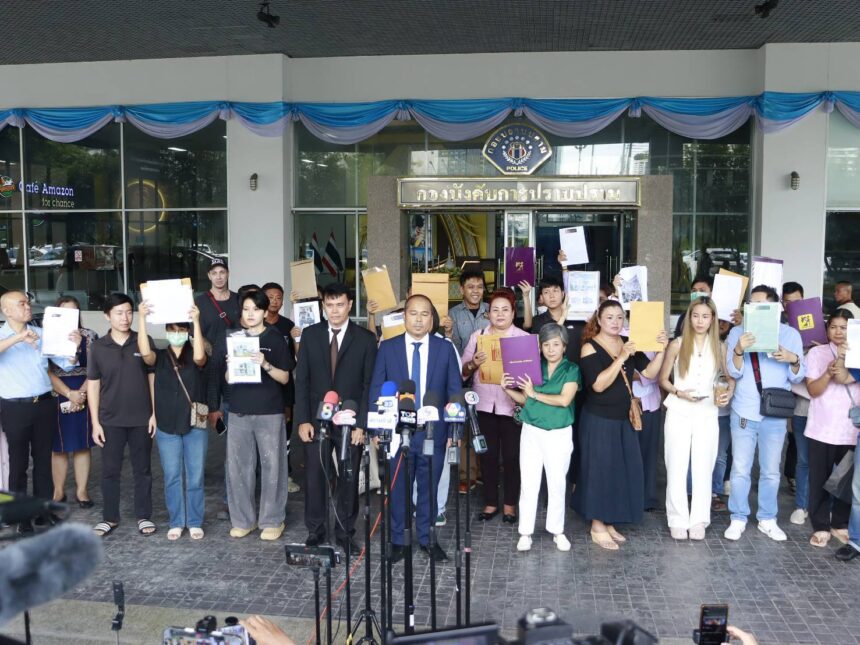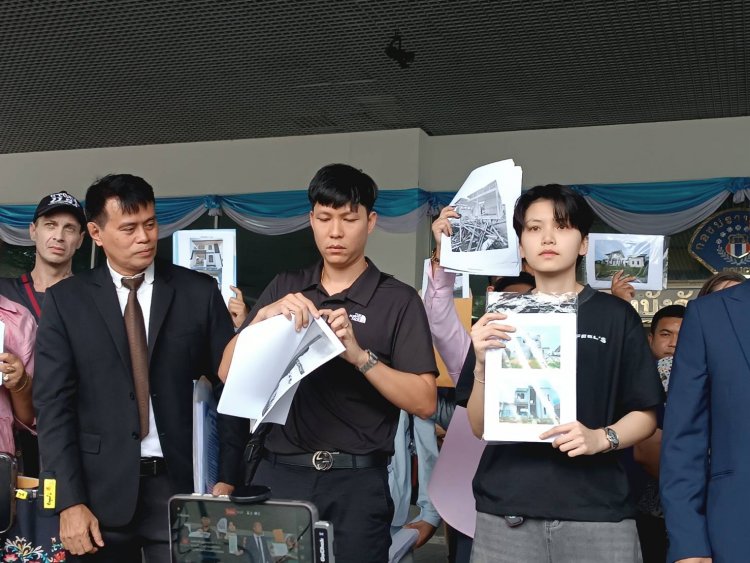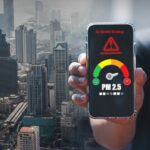BANGKOK – Over 20 upset homebuyers from around Thailand gathered at the Central Investigation Bureau (CIB) headquarters on Thursday, submitting a group petition against a leading real estate developer accused of fraud.
The buyers say the company took more than 300 million baht in advance payments for luxury homes, then stopped building, leaving families with half-finished houses, heavy debts, and broken promises.
The complaint, filed with CIB Deputy Commissioner Pol Maj Gen Jruykiat Pankaeo, describes the developer’s repeated false assurances. Buyers signed contracts for homes costing between 3 million and 10 million baht, with construction in popular areas near Bangkok and locations like Chon Buri and Rayong.
Instead of new homes, buyers found abandoned sites full of weeds. The company is accused of continuing to take money from new customers even as projects stalled. “We gave them our savings, thinking of our families’ futures,” said one woman from Nonthaburi, a 52-year-old civil servant, who chose to stay anonymous for safety. “Now we have houses we cannot live in.”
Somyot Chaiyaphon, a lawyer representing several homebuyers, explained that the group came together on a Line chat, which now includes at least 163 people nationwide, all with similar experiences of loss.
“Each contract sounds like a civil dispute, but there’s clear trickery,” Somyot said as he spoke with reporters outside the CIB building. “They asked for big upfront payments, said delays were due to paperwork or weather, then disappeared. It’s like a Ponzi scheme targeting those trying to improve their lives.”
Information from the Bangkok Post details many broken promises and suspected financial tricks.
Some homebuyers said they made payments for construction milestones that never happened, like paying for foundations only to see walls and roofs left unfinished or poorly built. One subcontractor joined the petition after not being paid 70,000 baht for his team’s work on several sites.
“They held back our wages, talked about cash flow problems, yet their managers drove luxury cars,” he said, matching the frustrations of other workers caught up in the mess. According to the Post, these delays often started with the developer refusing to pay contractors, forcing them to leave sites unfinished.
The name of the developer has not been released, but filings call them a “big player” involved with land in the provinces. The company has not replied to requests for a statement. CIB staff promised to move quickly, saying the investigation could lead to official public fraud charges under Thai law if foul intentions are proven.
The large amount involved, more than 300 million baht (about $9 million), means asset freezes and arrests are possible. If the complaints are true, this might be one of Thailand’s biggest real estate scams in recent years.
Deepening Property Market Problems
This event is not a one-off. It highlights deep problems in Thailand’s property market, where some developers have taken advantage of eager buyers, especially during the rush for homes after the pandemic.
Foreign investors, hoping for holiday homes by the sea or central condos, are at risk, though most victims are locals. Recent headlines show a pattern of projects abandoned, counterfeit paperwork, and fake ownership set-ups that chip away at trust in this multibillion-baht industry.
The 2023 Koh Samui condo case shows this risk well. British retiree David Edward Chappelle lost 15 million baht after paying a developer who claimed to have finished units using fake licences. Chappelle, age 70, took his case to the CIB when he discovered the condos had no government approval, making titles worthless.
At least five buyers, mostly foreigners, lost over 100 million baht in total, with the developer selling units built on mortgaged land without telling anyone. “They tempted us with no transfer fees or stamp duty,” said Chappelle’s lawyer, Tewit Haji. “It was all a trick.” The case showed how developers sometimes target foreigners who do not know Thai rules, hiding problems with slick marketing.
Phuket has seen even worse. In September 2024, two Australian buyers won a civil case against a company that collected 5 million baht for a flat that was never delivered. Even with the win, they have not been paid since the developer declared bankruptcy.
Investment Schemes Targeting Homebuyers
Wider investigations found a villa scheme that trapped dozens, including Thai homebuyers, out of millions of baht in fake home sales on protected forest land. When police tore down the half-built houses for breaking environmental laws, many lost everything.
“We used our pensions, hoping for a safe place to retire. Now, we have nothing,” said one Thai victim in a 2024 Nation Thailand article.
These scams are not limited to islands. In December 2024, 70 Thais filed complaints with the Department of Special Investigation (DSI), saying they lost 3 billion baht from 200 buyers in a condo fraud disguised as a debt relief offer.
Ads on social media promised “guaranteed returns” on new apartments, but as soon as money was collected, projects stopped. In Chiang Mai, a similar story played out in 2023: a developer owed buyers 1 billion baht for high-rise buildings that never finished, with the DSI raiding their offices after dozens were left holding worthless contracts.
“Nominee” schemes also trap foreign homebuyers. These are illegal arrangements where a Thai citizen holds property titles for an expat, only to take over later. The House Condo Lawyer’s 2024 report warned that over 60% of frauds involve local operators, while foreigners lost up to 400 million baht in a single Koh Samui deal gone wrong.
Later that year, local police charged 16 people, including a German developer and Thai nominees, over a scam that tricked investors out of millions for a fake villa project. The Consumer Protection Board says many complaints feature false ads, poor construction materials, and long delays, with cases rising by 25% in the past year.
Experts say that tighter budgets, a slow economy, and a rush of foreign buyers have increased risks. Bank of Thailand data shows residential transfers dropped 6.6% in 2023. Yet foreign purchases jumped 25%, led by Chinese homebuyers, who made up almost half of these deals last year. Real estate research warns these buyers now face new, more complex scams, such as fake off-plan projects advertising high returns in tourist areas.
Real Estate Information Centre
Those considering buying in Thailand, whether for a city apartment or a beachfront house, need to take extra care. Thai law does not allow foreigners to own land directly, and limits them to 49% of any condo building.
It helps to start with a trusted, independent Thai lawyer (not one suggested by the developer) to check contracts, title papers, and any debts attached to the property. The Real Estate Information Centre (REIC) can be used to check the track record of developers and ensure that projects have all the proper government approvals.
When buying a condo, depositing money in an escrow account is now common and means funds are kept safe until building targets are met. Avoiding nominee arrangements is best, as they are illegal and put your money at risk.
For those who want landed properties, a 30-year lease (with possible renewals) or documented rights to use and earn income from the property can offer some security.
Another option is setting up a Thai company with real Thai shareholders, but this needs legal advice. Sending money using Foreign Exchange Transaction (FET) forms can help buyers avoid tax headaches.
Background checks are crucial. Look into a developer’s finances, old projects, and records of legal trouble—companies like Bangkok Investigators can help. Avoid putting money into buildings that have not yet been constructed, unless the developer is well-known and offers payment plans that match progress.
Large, established firms like Sansiri or Origin often offer these features. Translate every contract into your own language and look for hidden charges or cancellation fees.
Thailand continues to attract homebuyers from around the world, but the recent wave of fraud cases serves as a warning. Rushing into deals can lead to heartbreak and big financial loss.
Somyot Chaiyaphon said many have been left without homes, yet they still hope justice will come as the CIB’s investigation continues. The outcome could set a new standard for the industry—or reveal even bigger flaws in the way property is bought and sold in the country.



















